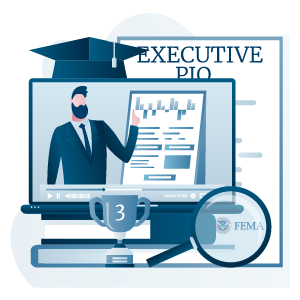Learning for a Career in Emergency Management
Learning for a Career in Emergency Management
The vision of the Federal Emergency Management Agency's (FEMA's) National Disaster & Emergency Management University (NDEMU) is to strengthen the field of emergency management by establishing an Emergency Management Professional Program (EMPP). The EMPP provides a framework for acquiring the knowledge, skills, and abilities to enter and progress through the field and to meet the challenges of a dynamic and complex environment.
The EMPP academies provide a structured and progressive framework for emergency managers to acquire the knowledge, skills, and abilities to progress through their professional development and meet the challenges of a dynamic and complex emergency management environment. The entire EMPP curriculum is designed to provide a lifetime of learning for a career in emergency management. The Basic Academy is designed to develop the next generation of emergency managers. The Advanced Academy provides professional development in contemporary concepts and issues for mid-career emergency managers. The Executive Academy challenges and enhances the talents of the Nation’s emergency management executives through the application of critical thinking, visionary strategic planning, and managing the complex real-world problems in today’s emergency management environment.
National Emergency Management Academies
-
National Emergency Management Basic Academy (NEMBA)

Foundational knowledge and skills in Emergency Management
-
National Emergency Management Advanced Academy (NEMAA)

Advanced Concepts and Issues in Emergency Management
-
National Emergency Management Executive Academy (NEMEA)

Executive Level Leadership Theories, Strategic and Critical Thinking
Public Information Officer (PIO)
Public information is a vital function in disaster operations that contributes greatly to saving lives and protecting property.
As such, the PIO Awareness and Basic courses form an important role of the foundational curriculum for professional emergency managers, and are contained within the EMPP Basic Academy course requirements.
-
Public Information Awareness and Basics

Underlying concepts, and the basic skills needed for full or part time PIOs
-
Advanced Public Information Officer

Apply Advanced Public Information Skills in a Multi-Day Functional Exercise
-
Executive Public Information Officer Program

Expanded Role in Delivering Strategic Public Information and Warning
IAEM Resources
The International Association of Emergency Managers (IAEM) is enhancing current benefits and implementing efforts to support federal employees in emergency management or disaster relief whose employment may have been impacted by recent changes. For more information, visit the IAEM Resource Center
EMPP Testimonials
If you would like to share a testimonial please e-mail [email protected] and include a statement that FEMA can release the testimonial to the public
(you can address the questions below or use your own format).
Emily Kies, Emergency Preparedness Coordinator, Illinois
“I have gained a great network of experiences to draw upon in a variety of fields. I have gained a greater insight into the challenges that other EM’s face, and possible solutions. I have implemented pieces of an Emergency Management Program, but haven’t gotten a solid handle on the Program as a whole, I feel like the Academy has given me the tools to take the pieces of the program and bring them together and fill the gaps”
Emily Kies, Emergency Preparedness Coordinator, Illinois
“Most definitely, I think every disaster or incident I have participated in has a component that has correlated from the training from the Academy. Actually I just got a phone call today from the State to be a part of the committee to assist in implementing updates and changes for the Administrative Code that we operate under. I was just thinking about how the Change Management course as well as the individuals that are state coordinators would be really beneficial moving forward in this project. I didn’t attend Basic Academy, so I will have to keep you posted”
Mr. George E Collins, Jr. - Director Safety and Human Capital (Edgewood Chemical Biological Center, Aberdeen Proving Ground, MD)
“The subject matter experts you brought in to lead the program provided real world knowledge and experience to each session. As an added bonus they also were very good instructors that were always able to keep participants fully engaged. I would highly recommend the National Emergency Management Basic Academy for any organization that faces a real-world crisis requiring emergency response personnel”
Jansen Robinson, Basic Academy graduate (Edgewood Chemical Biological Center, Aberdeen Proving Ground, MD)
“We engaged in a rigorous training schedule that encompassed four separate weeks of training and over this time period training developed our initial knowledge, and skills needed to perform within the emergency management career field. We also believed it reinforced the qualities needed to manage an emergency management program”
Nancy Carter, Basic Academy graduate (Edgewood Chemical Biological Center, Aberdeen Proving Ground, MD)
“The instructors provided during the Basic Academy were the best resource of this course. The mix of local emergency management personnel, and those who have worked at a state and federal level gave the class the benefit of learning from their first-hand experience but by also being able to relate to situations they had dealt with. The instructors also had a chance to learn from us, since we deal with some very specific high hazard areas in chemical and biological defense. It was a great interaction all around”
Eric Stevens - Basic Academy graduate (U.S. Army Test and Evaluation Command, Aberdeen Proving Ground, MD)
“The Basic Academy curriculum is some of the best training that I have received during my government career. Beyond the applicability to my duties, the training offered a unique opportunity to network with other emergency management personnel in the region and to learn from seasoned emergency managers with a wealth of experience at the Federal, state, and local levels. The value of the instructors' real-world experience and ability to apply that experience in the learning environment cannot be overstated”
Tom Tarrants, Preparedness Specialist, U.S. Coast Guard Fifth District
“The U.S. Coast Guard (USCG) has placed tremendous value in the FEMA NDEMU training programs. The USCG has incorporated NDEMU Independent Study courses into mandated training for all personnel, emergency management related certifications and qualifications and as prerequisites for some Coast Guard resident training courses. In addition, the Coast Guard Headquarters Office of Contingency Preparedness and Exercise Policy (CG-CPE) provides funding for personnel assigned specific types of duties to attend career enhancing training at NDEMU. In addition, some District offices are doing the same at their level.”
“Several highlights are identified below.”
“The IS-100, IS-700, and IS-800 courses are Mandated Training for all Coast Guard personnel, military and civilian. Additionally, many other IS courses are required training for mid-level and higher personnel.”
“The Response Officer Specialty Competency Contingency Preparedness Specialist (OAR-18) requires the completion of NDEMU training courses to obtain the Apprentice, Journeyman and Master level certification.”
“– Apprentice level requires Homeland Security Exercise and Evaluation Program (HSEEP) (K/L0146), IS-230, IS-235, and IS-453”
“– Journeyman level requires IS-240, IS-241, IS-242, IS-454, IS457, IS-809, IS-810 and IS-820”
“– Master level requires Master Exercise Practitioner Program (MEPP), IS-293, IS-775 and IS-860”
“CG-CPE has funding set aside annually for personnel to attend the MEPP, National Emergency Management Advanced Academy (NEMAA), and National Emergency Management Executive Academy (NEMAA) and in the past has sponsored Coast Guard specific MEPP cohorts”
Emergency Management Core Competencies for Training
-
Foundations Training and Education Level
This competency area focuses on the knowledge that emergency management professionals need to plan and prepare for all-hazard incidents, and to organize and manage emergency preparedness and response efforts
-
Specialized Training and Education Level
This competency area focuses on the knowledge and/or skills emergency management professionals need to design effective approaches to (plans for) mitigating, preventing, or protecting against; preparing for; responding to; and recovering from all-hazard incidents, both natural and manmade
-
Executive/Managerial Training and Education Level
This competency area focuses on the knowledge and/or skills that managers need to manage an organization.
-
Strategic Leadership Training and Education Level
This competency area focuses on the knowledge and/or skills that leaders need to create a results-oriented emergency management organization
Frequently Asked Questions
There is no tuition associated with the courses. Most students who are enrolled in the courses will be housed on-campus at no costs. Once notified from the NETC Admissions Office of enrollment, you will schedule your flight and purchase a meal ticket. You will be responsible for costs related to travel and food. If you qualify, you may be eligible for stipend reimbursement for travel related costs. Please contact the NETC Admissions Office for questions related to lodging, travel, purchase of the meal ticket, and stipend reimbursement at 301-447-1035 or email
No, you can apply for the academies based on years of EM experience, please review the target audience for each academy on the EMPP webpage.
Unfortunately you cannot substitute any course for the EMPP curriculum. In the Basic Academy, we recently replaced E/L0104 Exercise Design with E/K/L0146 HSEEP; either of these courses will meet the requirement towards the Basic Academy completion certificate.
The EMPP curriculum is not considered a higher education certification; it is a professional development program based on years of experience in the emergency management field. However, most of the courses are ACE accredited and you can apply the training hours towards the AEM or CEM.
Traditionally, the EMPP courses are residential, you can take the classes at NDEMU in Emmitsburg, MD or if offered by the state. Courses have been offered virtually during the pandemic; however, the goal is to offer in person training. The Executive Academy is not offered in the state.
We recommend taking the Basic Academy courses in order, but is not a requirement. Most of the students complete E0101 in 5 days and then come back to NDEMU later to complete E0102-E0105. It is recommended to take all of the courses, but you can enroll in an individual class to accommodate your busy schedule. There is no time limit to complete the Basic Academy courses.
Students are normally required to take the four Executive Academy courses in order. Considerations will be made for students due to emergency situations to take the courses out of order. Students are not allowed to enroll in a single course.
If your application is not selected for the Executive Academy, it will be referred to the Basic and Advanced Academy selection board for review.
Points of Contact
Contact these individuals for more information about the following programs
| Contact | |
|---|---|
| Dr. Jeff Januchowski | Emergency Management Professional Program |
| Dr. Jeff Januchowski | National Emergency Management Basic Academy |
| Roxanne Falconer | National Emergency Management Advanced Academy |
| Roxanne Falconer | National Emergency Management Executive Academy |
| Nicole Shutts | Public Information Officer Program |
